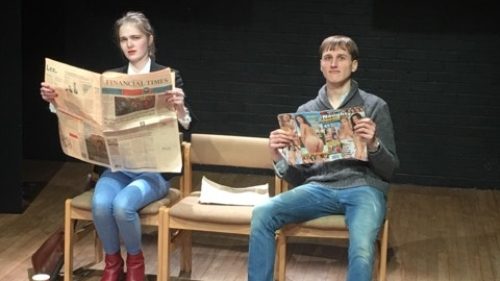When I first saw the play’s evocative title, I was immediately reminded of Samuel Beckett’s Waiting for Godot. However, Agnes Pethers’ finely calibrated production proved to be a pleasant surprise, as in certain ways, it surpasses the Beckettian classic.
The premise of Waiting for Gary is a simple one. Two adults in a NHS maternity ward. Three chairs. The Financial Times. And magic.
None of the surreal apocalyptic setting of Godot, nor the absurd slapstick, were needed. What we have instead is a universal humour that focuses on the simplicity of our everyday lives and the inherent funniness within.
Yet Waiting for Gary is not played only for laughs; it is entertaining because of the emotional truth underlying the humour. “Comedy is a powerful tool for discussing social issues,” explained Katie Sayer, the writer and President of the Oxford Revue: “once you’ve made an audience laugh, you can use comedy to disguise some quite serious points.”
Indeed, as the play moves fluidly between motifs such as pornography, parenthood, unplanned pregnancies and pooing during labour, the audience were confronted by shocking and often unheard truths, through the lens of our two main actors: Dorothy McDowell as Anya, and Tom Fisher as Chris. The two have been divorced for eighteen years but are finally reunited outside the maternity ward, waiting for Gary, their grandson.
Framed in the luminous white light of an intimate stage, the actors are constantly called to perform in a fantastic display of nervous energy. Anya, characterised by her sarcasm and incisive discourse, has a commanding presence on stage. The way she engages and interacts with the audience and the way she paces back and forth maintain a razor-sharp tension in her performance. I found it especially entertaining to witness her throwing Chris’s words back at him verbatim in her many passionate outbursts, much to the latter’s dumbstruck dismay. As the play progresses, it is heartwarming to see her attitude to her ex-husband changing from icy coldness to gradual reconciliation. Her position on stage reflects this fact, as she begins to sit next to Chris and even teasingly bumps his arm.
At times exasperated, at times tender, Chris has a certain Chaplinesque air about him. Not only does he farcically spark their interaction by reading a porn magazine under the Financial Times, but he is also the source of many blissfully funny moments throughout. Nervously crossing and uncrossing his legs, running his hand desperately through his hair, but also peeping at Anya when he thinks she is not looking, he was particularly masterful with his body language — in his character, the unspoken enjoys as much importance as the spoken lines.
At this point, I would like to give a honourable mention to the third most important ‘character’ — the Financial Times. Once a barrier and camouflage for the pair to hide behind in their awkwardness, one of the most iconic scenes in the play involves them repeatedly raising and lowering their newspapers, almost like a shield. However, as they warm to and reconcile with each other, the newspaper then duly served its purpose, and is left tattered on the seat.
Unlike Godot, Gary finally arrives after nearly an hour of tension and hilarity, and with him, the ending of the play. There is something satisfactory about its ending: unlike the numbing no show of Godot, the audience can join together in the celebration of new life. Both for Gary and our stars, Anya and Chris.



